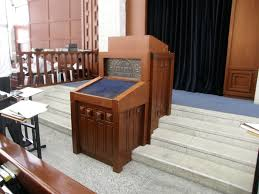My turn on the Bimah at my present shul comes about three times every two months, estimated eighteen times a year, though I do not keep count. The office manager or IT maven keeps electronic copies of the weekly Shabbos bulletin, so I could figure out how many by imposing on them. Or I rarely deplete the electronic newsletter that comes from the congregation every Thursday evening, so if I really wanted to know how many times I take my turn leading something, I could figure it out. Three events every two months seems a reasonable estimate. In recent years my assignments have been to lead Shacharit, the Morning Prayer, and to take my turn when the synagogue's men chant the weekly Torah portion. About three times a year, the Gabbai will invite me to chant the Haftarah. In another era, I did a chapter of Esther, but discontinued that when I took a job that would not allow me to return to repeat my chapter the next morning. And I've done a chapter of Ruth one time. Nearly all are Shacharit and Torah presentations.
Some of these skills I learned for my Bar Mitzvah, tutored in a Cantillation Class with other Hebrew School boys, then private lessons with our Cantor, who also taught me shacharit. At summer camp, I learned Torah reading, let the skill lapse for many years, then took it back up when I settled in my current home forty years ago. I had also learned High Holy Day Torah reading, which has a separate melody. Most years I have been one of the Torah readers, chanting the entire portion for that morning.
The Internet has largely replaced the private tutor. While I can perform shacharit for Shabbos morning with no preparation, I periodically expand my repertoire. Each time my turn arises, I select two, sometimes three, melodies that I did not use the previous times. For Torah readings, I prefer to use the month's notice to learn one I've not done previously that has a length approaching the limits of my capacity. All Torah Aliyot and Haftarot are now recorded online in a variety of places. Leading the service can be taught from a number of Virtual Cantor sites that allow the learner to listen to and repeat segments of pretty much every service. My Go-To when I want to upgrade my skill has been Mechon Hadar, a blend of Think Tank, Synagogue, and Academy run by two Conservative Rabbis in Manhattan.
For all that I do, an invitation to lead Musaf has never been offered. After 25 years with my current congregation, nobody ever asked me if I wanted this assignment, or even if I possessed the skill. I don't. I could. Some months ago, I brought this oversight up to my friend who has the often unenviable task of guaranteeing that a man agree to lead each portion of the service on the next occasion, be it Shabbos or Festival. As soon as I pointed out this oversight, he agreed to add me to the Musaf rotation. I responded that I don't yet have the skill but will make an effort to acquire it later in the year. That's now.
I know the format. Words have a familiarity. It's mainly a matter of the melodies. Musaf comes in three sections. First the Torah needs replacement in the Ark. One introductory prayer, beginning in Aramaic, end in Hebrew. Then a prayer for the Government recited in unison. Next, a variable prayer, most weeks a Memorial Prayer. Then Ashrei, then the Torah processional with two prayers. Not hard to learn these.
Sermon next. Then the challenging part. An introductory Kaddish with a tricky tune. Opening of the central prayer and closing of the central prayer I know. Then a Kedushah which I am familiar. Finally some more intense text that I will have to learn. The morning ends with closing prayers that I already know.
Checked out the sites. Mechon, JTS primarily. Listened to the tunes, which are variations of what my congregation does. JTS melodies are recorded by a professional cantor who I cannot duplicate. So is much of Mechon, but they have a woman who sings in a more lyrical way that I can duplicate. That makes this project within reach. And as I attend services, I can pay attention to the cantorial parts each week, then go home and practice. Figure two months to learn this, which would take my debut to shortly after the Holy Days. Definitely a project within reach.


No comments:
Post a Comment